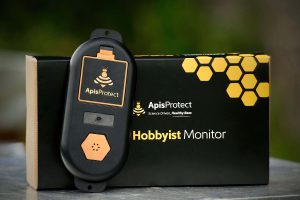Thanks to Allison LaSorda from Scientific American for chatting with us about how we are working with beekeepers to help them monitor their honey bee colonies.
In this in-depth article, Allison examines the challenges facing beekeepers to ensure healthy colonies can pollinate a third of our food.
“In white full-body suits with square veils, amid the steady hum of hives and puffs of smoke, beekeepers appear otherworldly. But their daunting work is crucial to maintaining the many global food crops that require pollination. Day-to-day tasks involve assessing the health and production of honeybee hives: periodically and manually opening each one for inspection, ensuring that the queen is present and laying eggs and that the workers are active, and looking for any signs of pests or disease. Especially at commercial beekeeping operations—ones that manage at least hundreds of hives—this involves considerable time, effort and expense. And the intensity of the work can make it difficult for beekeepers to spot the signs of an ailing hive early enough to prevent its collapse.”
Alisson goes on to highlight how technology can be part of the solution by directing beekeepers to the beehives that need their attention the most.
“Hive data collected by ApisProtect, an Ireland-based company, indicate that the sensors halve the time needed for beekeepers to inspect hives, allowing them to focus on the ones that need more attention, says ApisProtect’s head of marketing Aoife O’ Mahony.”
“The technology also helps beekeepers identify weaker hives, which reduces vehicle trips to the bee yard for manual checks of colonies and cuts costs associated with replacing weak hives, O’Mahony says.”
Read the full article here or watch this short video to learn more about this innovative bee hive monitoring system for hobbyist beekeepers in Ireland and the UK.

